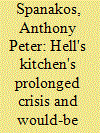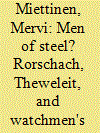|
|
|
Sort Order |
|
|
|
Items / Page
|
|
|
|
|
|
|
| Srl | Item |
| 1 |
ID:
131547


|
|
|
|
|
| Publication |
2014.
|
| Summary/Abstract |
On June 26, 2012, Marvel's The Avengers became the third movie in history to earn $600 million dollars at the box office. The film was well received by fans and critics alike and it stood at the apex of a series of superhero movies released in the last decade. The mass appeal of the superhero, as evidenced by this success, has never seemed more powerful than in the years since September 11, a day that floored the likes of Captain America, who wept amidst the rubble with Spider-Man. "Some things are beyond words. Beyond comprehension. Beyond forgiveness" (Straczynski, Romita, and Hanna 2001, 2-3). In this atmosphere of uncertainty, comic book writers struggle to deal with the realization that, when America needed its heroes the most, they could only stand among the wreckage of the smoldering twin towers with the rest of us and ask "why?"
|
|
|
|
|
|
|
|
|
|
|
|
|
|
|
|
| 2 |
ID:
131539


|
|
|
|
|
| Publication |
2014.
|
| Summary/Abstract |
Comic book heroes often have their origins in noir depictions of failed or failing states. The danger involved and the seeming anarchy that necessitates superheroes recall Hobbes's description of a state of nature and Leviathan as resolution. But comic book heroes generally inhabit states that are better identified by the Hobbes-inspired Carl Schmitt. Indeed, this articles argues that while the Hell's Kitchen of Daredevil comics has some characteristics of a state of nature, it is better characterized by the protracted crisis of state that Schmitt sees in liberal democracies. Hobbes and Schmitt elucidate the crisis that generates the need for a superhero but fail to explain why the superhero does not simply take over the city. This is better explained by American concepts of heroism which emphasize redemption and walking away from power (Lawrence and Jewett 2002).
|
|
|
|
|
|
|
|
|
|
|
|
|
|
|
|
| 3 |
ID:
131543


|
|
|
|
|
| Publication |
2014.
|
| Summary/Abstract |
Set in 1978, the year Edward Said published Orientalism, Salman Rushdie's Midnight's Children depicts "magic children" born in the first hour of August 15, 1947, "within the frontiers of the infant sovereign state of India" (1981, 226, 224). Through some "freak of biology" or "preternatural power," the children receive "miraculous" abilities, including such superhero staples as flight, time-travel, and "a boy who could increase or reduce his size at will" (224, 227, 228). For his mind-reading narrator, Rushdie evokes the Shadow's 1930s radio slogan: "the ability to look into the hearts and minds of men" (229). The American Shadow, like so many of his descendants and predecessors, gained his powers from the mythical Orient, but the fantastical abilities that Rushdie awards the first citizens born in independent India mark the end of colonial exploitation and the transfer of real-world political power from colonizers to the formerly colonized.
|
|
|
|
|
|
|
|
|
|
|
|
|
|
|
|
| 4 |
ID:
131542


|
|
|
|
|
| Publication |
2014.
|
| Summary/Abstract |
Watchmen (1987), written by Alan Moore and illustrated by Dave Gibbons, is a 12-part graphic novel that portrays real-life superheroes in a fictional United States of the 1980s. An alternate universe where ordinary people without superpowers were inspired by superhero comics and took on the crime-fighting in tights in the 1940s, the comic portrays an America vastly different from our reality. Since its publication more than two decades ago, the comic has been the subject of extensive study due to its breathtaking narrative structure as well as its acute deconstruction of the superhero genre itself. Indeed, one of the text's most brutal deconstructions comes from the way it addresses superheroic masculinity, from the misogynistic vigilante Rorschach to the emasculated ex-hero Nite Owl. Through its cast of male heroes, Watchmen deconstructs the superhero genre by rewriting masculine tropes such as vigilantism and patriotism and by exposing the inherent contradictions within these gender-bound tropes from the fascist undercurrents of violent patriotism to the often-hinted sexual dysfunction of the costume-fetish variety.
|
|
|
|
|
|
|
|
|
|
|
|
|
|
|
|
|
|
|
|
|